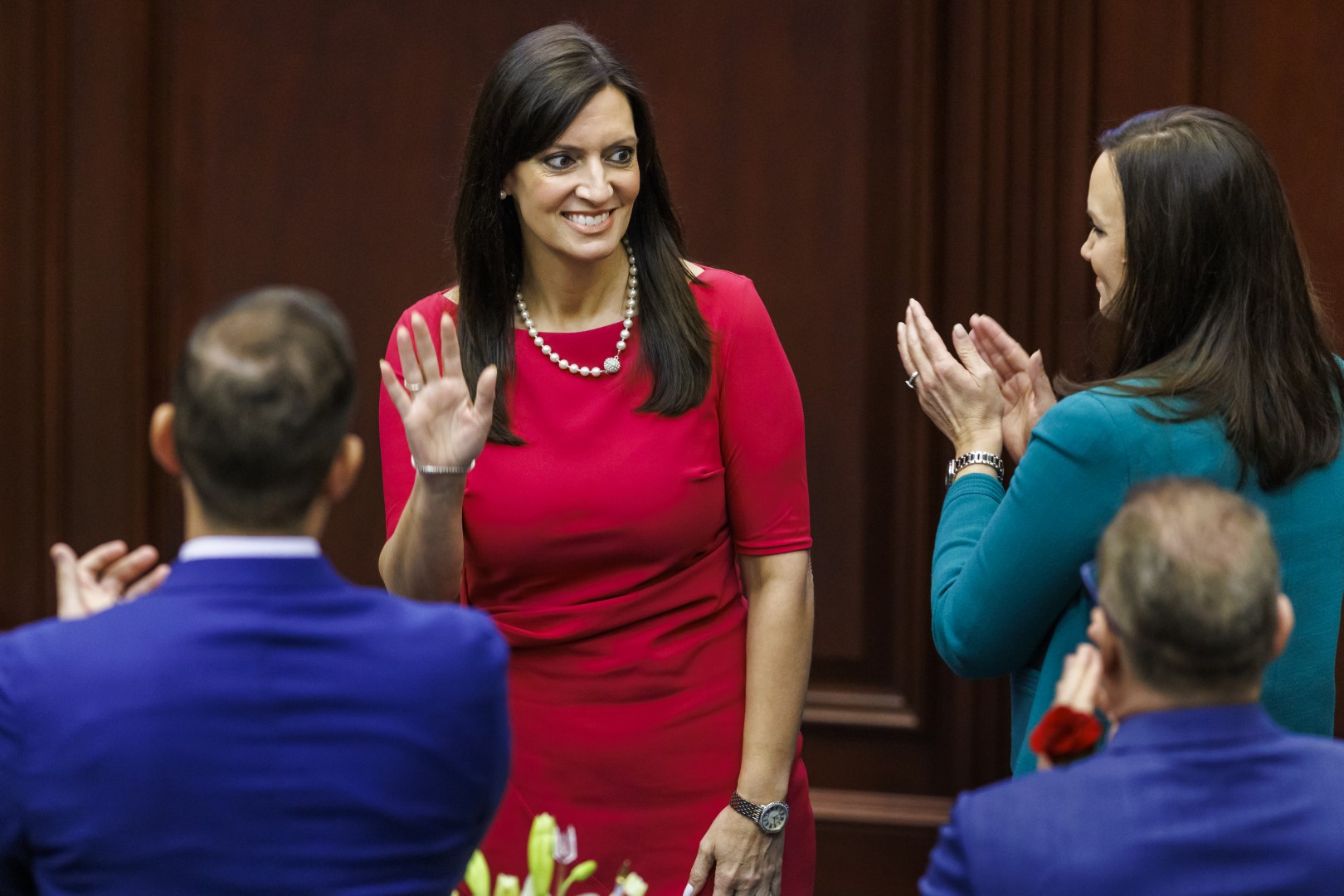Lt. Gov. Jeanette Nuñez will take over the operations of her former alma mater, Florida International University (FIU), after a vote by the school’s leadership.
The FIU Board of Trustees voted 11 to 1 to hire Nuñez as Interim President, finalizing plans Gov. Ron DeSantis set in motion weeks ago to install his second-in-command in the public university’s top post.
“I am honored,” Nuñez said in a statement.
“As a two-time alumna and a proud Panther mom, I am deeply committed to the success of FIU. I look forward to working with the Board of Trustees in the coming days.
Nuñez will replace President Kenneth Jessell, who has led FIU since March 2022. Jessell’s contract with FIU runs through the end of 2024, according to CBS Miami. Nuñez will officially become Interim President on Feb. 17, the Miami Herald reported.
Jessell said after Friday’s vote that he has “complete confidence” in her and looks “forward to supporting her.”
Nuñez, a 52-year-old Republican, will be the first woman and the first FIU graduate to lead the university. She earned a bachelor’s degree in political science and international relations in 1994 and a master’s degree in public administration in 1998, both from FIU.
Today, she lives a 15-minute drive from the school’s main campus in West Miami-Dade, state records show.
FIU Chair Rogelio Tovar confirmed that DeSantis had “contacted (him) and suggested (that the Board) consider … Nuñez as the next leader of FIU.”
Board member Nöel Barengo, an associate professor at FIU and Chair of the FIU Faculty Senate, was alone in voting “no,” according to NBC 6.
Nuñez’s pending departure from the Governor’s Office comes after GOP state lawmakers voted to undo one of her signature legislative achievements from which many FIU alums have benefitted.
In 2014, Nuñez successfully carried legislation to allow undocumented students brought to the country as children to pay in-state tuition rates at state universities. She said at the time that the measure was “about upward mobility” for young adults on whom the state had already spent “tens of thousands of dollars” to educate in public schools, adding, “it doesn’t make sense to hold these children back.”
DeSantis tried, but failed, to repeal that provision in a sweeping anti-illegal immigration bill he signed in 2023. The Legislature voted along party lines last month for a package that would remove the allowance, though the Governor has indicated he may veto the bill, which lawmakers substituted for a proposal from his office.
Nuñez’s arrival at FIU’s top office will also coincide with the school’s efforts to increase its state funding apportionment and be the location of President Donald Trump’s future presidential library.
Post-election polling in November found that among five Republicans that won or hold statewide offices — including Trump, DeSantis, Nuñez, U.S. Sen. Rick Scott and Marco Rubio, who left the Senate to serve as Trump’s Secretary of State — Nuñez was alone in having a positive approval rating.
But the survey also revealed she has a relatively low name ID, with 47% of voters saying they didn’t know who she was and 26% having no opinion about her job performance.
Nuñez got into politics in the mid-1990s, as an aide to then-state Sen. Alex Díaz le al Portilla, whose most recent elected job was as a Miami City Commissioner.
In 2004, she began working as Director for Statewide Government Relations at Jackson Health System, Miami-Dade County’s public hospital network. Six years later, she took a Vice President of Community Affairs job with for-profit hospital company HCA Healthcare, overseeing outreach for the Kendall Regional Medical Center and Aventura Hospital and Medical Center.
She started a consulting firm called OnPoint Strategies LLC in 2013 that did business with Jackson Health System. State records show the firm became inactive in 2020.
Nuñez ran for the Florida House in 2010 and won by a landslide, taking 63% of the vote in a three-way race for a district that spanned a western swath of unincorporated Miami-Dade, including the Kendall area.
She served for eight straight years, including as Speaker Pro Tempore and Deputy Whip.
As a lawmaker, Nuñez leveraged her knowledge of the health care industry to successfully sponsor several notable bills, including legislation to extend Florida’s sovereign immunity protections to university doctors working at public hospitals, improve umbilical cord blood banking provisions, add more guardrails to optometric practices and establish equitable insurance standards for patients seeking cancer treatment.
She also passed bills to improve Florida’s programming for diabetes management and treatment and address opioid addiction in health insurance.
Other bills she saw through to passage included multiple measures aimed at better serving and housing sexually exploited children, removing the statute of limitations for victims of child sex abuse, banning marriage for underage couples and heightening programming requirements for domestic abusers seeking probation.
As Lieutenant Governor, Nuñez has been tasked with managing the Florida Department of Health and chairing Space Florida and Florida’s Cybersecurity Task force. She’s also an active member of the Statewide Council on Human Trafficking, leading discussions on an issue about which she’s been vocally passionate.
When DeSantis ran for President last year, Nuñez endorsed him, describing him as a “great Governor and an even better man” who “does not waiver in the face of adversity.”
Nuñez was among those rumored last year to be on DeSantis’ shortlist to replace Rubio after Trump tapped the Senator for Secretary of State. The Governor ultimately chose Ashley Moody, whom voters re-elected as Attorney General in 2022.
Nuñez has also been discussed as a potential candidate for Governor and Miami-Dade Mayor.
Post Views: 0

 Entertainment8 years ago
Entertainment8 years ago
 Entertainment8 years ago
Entertainment8 years ago
 Politics8 years ago
Politics8 years ago
 Tech8 years ago
Tech8 years ago
 Tech8 years ago
Tech8 years ago
 Tech8 years ago
Tech8 years ago
 Politics8 years ago
Politics8 years ago
 Tech8 years ago
Tech8 years ago










